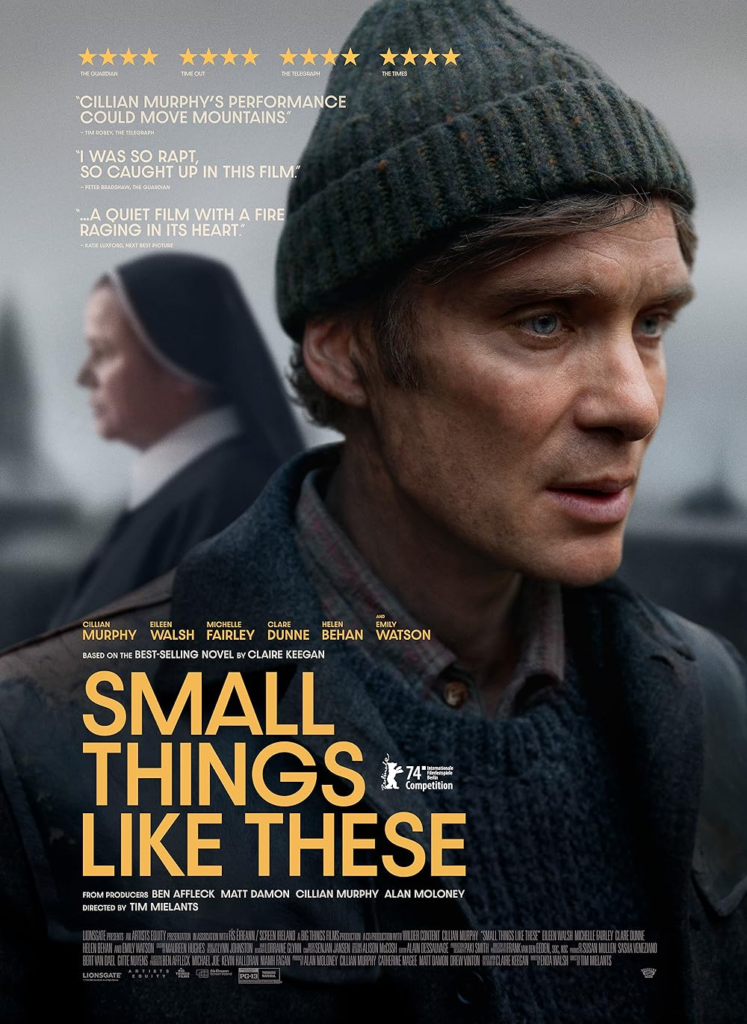Small Things Like These Christian Review

Small Things Like These is a film that sneaks up on you with its quiet power. It doesn’t shout or shove its themes in your face but seeps slowly, like ink on a page, staining you in the best way possible. This isn’t just any story—it’s a reflection on moral courage, faith, and that subtle but profound question: What does it mean to do the right thing when everyone else turns away?
This movie doesn’t fit into the usual boxes. There’s no loud conflict, no easy villain, no overly dramatic climax. Instead, it’s a slice of life—one small life, in a small town, doing the kind of work most people don’t notice. But that’s where the story’s weight lies. Through Cillian Murphy’s deeply moving, restrained performance, we see a man grappling with choices that echo timeless, universal struggles. Small Things Like These doesn’t preach, but its message lands with a surprising punch that many Christian viewers will recognize as a call to live out faith with quiet integrity.
The Burden of Seeing—And Choosing Not to Look Away
At its core, this film is about complicity and courage—two concepts that often clash, especially when people are caught in systems of silence. Murphy’s character, a coal merchant named Bill Furlong, lives a simple life. He delivers coal, cares for his family, and expects very little beyond his daily routine. But his story isn’t about what he gains; it’s about what he sacrifices. His life changes when he stumbles upon a stark reality: a young girl, locked away and mistreated, in a place run by nuns—a place that should represent faith, hope, and love.
The dilemma that Small Things Like These presents is painfully relatable. When Bill discovers the girl, he is faced with a choice: do something, or do nothing. It’s so easy to look away, to rationalize and walk away as if nothing ever happened. But Bill’s struggle is the same one faced by anyone who’s ever been called to stand up against something wrong, even if it means discomfort, rejection, or even loss. It’s a choice that feels personal and profound, echoing a familiar Christian principle: to be salt and light in a world that sometimes prefers the shadows.
A Question of Faith—What Should Faith Really Look Like?
This movie touches on a critical issue for Christian audiences: What should faith look like? Should it sit comfortably within rituals, safe and secluded, or does faith demand something more costly, more uncomfortable? This question reverberates as we watch Bill’s journey because the nuns and clergy who oversee the institution are also the very people turning a blind eye to suffering, excusing or ignoring what they know is wrong. Bill isn’t a hero in the conventional sense, but he’s someone who learns to listen to the quiet voice of conscience, that call many would say is God Himself.
For many believers, Small Things Like These stirs a holy unrest. It challenges the idea of faith as something separate from our decisions, choices, and actions. Here is a character, imperfect and burdened, who finds that true faith doesn’t allow us to ignore injustice or let others suffer. It’s a powerful, haunting reminder that faith demands empathy, responsibility, and action—even when it’s messy or inconvenient.
The Beauty of Humble Faith: Murphy’s Performance and What It Means
Murphy’s performance as Bill Furlong is like a slow-burning candle; it doesn’t flash or flare, but it holds steady, illuminating the simple but difficult path he’s on. Murphy’s Bill isn’t outwardly expressive; he doesn’t wear his heart on his sleeve. Instead, he’s all restrained tension and subtle emotion, a man learning to trust in the kind of faith that isn’t concerned with approval but with doing what’s right. His quiet transformation is beautifully captured in Tim Mielants’s direction, with a camera that lingers in silence, allowing the audience to feel each painful decision.
For Christians, Murphy’s portrayal can be an example of how true faith isn’t loud or attention-seeking. It’s steady, humble, often unnoticed. Bill doesn’t become a hero or martyr in the grand sense; he simply chooses to do what his conscience tells him, following a moral compass that, though not always visible, is there, guiding him through life. His decisions reveal a type of courage that often goes unnoticed: the courage to love others even when it costs you something.
Where Faith Meets Humanity—A Story for Today
Small Things Like These might be set in 1985 Ireland, but the questions it raises resonate today, perhaps even more sharply. It speaks to our current world—a world that still struggles with issues of complicity, moral integrity, and justice. While the movie speaks to a particular time and place, the questions it asks about faith and action are relevant for every generation.
For American Christians, especially, the film challenges a tendency to compartmentalize faith, to keep it locked within Sunday services or private spaces. Bill’s faith isn’t displayed in grand gestures but through small, painful choices that reveal the heart of what it means to follow Christ’s example: loving others, defending the vulnerable, and standing for truth even when it isn’t convenient or celebrated.
A Call to Action, Wrapped in a Simple Story
One of the most moving aspects of this story is that it doesn’t end with a typical resolution. Bill’s choice to help doesn’t make him a saint; he simply does what he knows is right, regardless of what it may cost him later. This isn’t a movie that seeks to resolve all tension neatly; it ends with a sense of openness, of quiet but determined commitment to doing what’s right. It’s a story that encourages Christians to look beyond the surface, to understand that our small actions, though simple, can have profound impacts on others.
Faith isn’t meant to be a shield from discomfort or sacrifice; it’s a path that often requires both. The film leaves us with the sense that the real power of faith isn’t in grandiosity but in integrity—the kind that moves us to compassion and courage, not out of duty, but out of love.
A Lasting Impression—Why This Film Matters
Small Things Like These lingers long after the credits roll, settling like a seed in the heart. It doesn’t offer easy answers or simple solutions, but it leaves us with a question: What kind of person do we want to be? For Christian viewers, this question takes on a particular weight. It’s an invitation to examine our own faith and how we live it out. It’s a call to remember that, often, the quiet, unseen choices are the ones that matter most.
In the end, Small Things Like These is more than just a film; it’s a call to action—a gentle but persistent reminder that faith, if real, will move us to love, protect, and stand up for others, even when no one’s watching. And in a world that could use a little more courage and compassion, maybe that’s exactly what we need to see.






